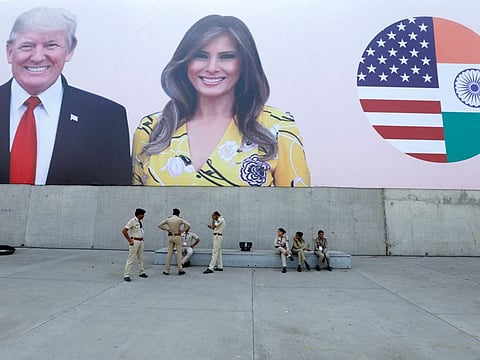‘Open mic’ Trump keeps India guessing
As New Delhi readies to play perfect host, doubts linger over US president’s public views

Ahmedabad: In the winter of 2015 — when then United States president Barack Obama was earning rave reviews for himself from the South Block mandarins and sections of the media in India, with his very public display of bonhomie with Indian Prime Minister Narendra Modi — little did one realise that the same Obama in the last itinerary on his tour would make a few pointed observations about secularism, in an unmistakable jibe at the Indian establishment’s perceived inability to offer an inclusive approach towards the social-political milieu prevailing in the country.
With yet another US president now scheduled to visit India, New Delhi will be watching and listening carefully to every word uttered, with some trepidation even.
More so, since Donald Trump is known to wear his heart on his sleeve, and for his off-the-cuff tweets and candid quotes.
“What Obama said at the Siri Fort Auditorium in New Delhi barely hours before his departure from India in January 2015, was, in a way, a tactful reminder to India of the values the country has always stood for. Given the anti-CAA protests and the abrogation of Article 370 in Kashmir, it remains to be seen whether Trump dabbles into those areas,” Robinder Sachdev, member of a New Delhi-based think tank, who is currently in Ahmedabad, told Gulf News here on Sunday.
For several other experts that Gulf News spoke to on the sidelines of the Trump visit to Ahmedabad, “give him the microphone and you never know what he’ll come up with” seemed to be a recurrent concern.
So has Trump been one of the most difficult US presidents for New Delhi to deal with?
“I do not quite agree with that. If you look at the Obama visit, what did India gain from it? Obama’s bonhomie with the Indian PM was such a talking point and yet, in tangible terms, there wasn’t much that New Delhi could make out of it. In comparison, I’d say that Trump is easier to deal with precisely because he calls a spade a spade,” commented Retd Major General K.K. Sinha from the Indian Army, who is also in Ahmedabad to offer expert opinion on television on Trump’s visit.
But isn’t Trump playing hard ball on trade negotiations with India?
“It’s wrong to see ‘trade deal’ as a broad-spectrum concept. ‘Trade’ has its contours that will have to be dealt with independently. Tariff on goods and services is one aspect, foreign direct investment is another, then there is e-Commerce,” said Sachdev.
These are dynamics that cannot be seen as a simplistic unity, he explained. Moreover, the India-US partnership is not just about trade but civil nuclear agreement, defence and technology are also crucial parameters, he added.
But then if there’s no trade deal then it will once again be a visit that’s steeped in optics and low on substance, one wondered.
But Achal Malhotra, a former Indian ambassador, told Gulf News that it would be wrong to say that a visit such as Trump’s is pure optics and nothing else.
“The very fact that Trump has agreed to come to India on a stand-alone visit, says a lot about its significance. The fact that he didn’t club this tour of India with any other South Asian nation sends out a clear message of intent on the part of America to see New Delhi increasingly as a stake holder in global security and intelligence-sharing and a major counterbalance to China’s growing clout in the Asia-Pacific,” Malhotra, a former Indian Foreign Service officer, said to put things in perspective.
But a vast section of experts are still wary about a Trump off-the-cuff playing the spoiler to a meticulously planned, high-stakes trip to India.
For now, much of the attention is focused on the Motera speech that Trump will deliver in Ahmedabad on Monday and the bilateral talks between the two leaders in New Delhi on Tuesday, before a joint declaration is issued.



